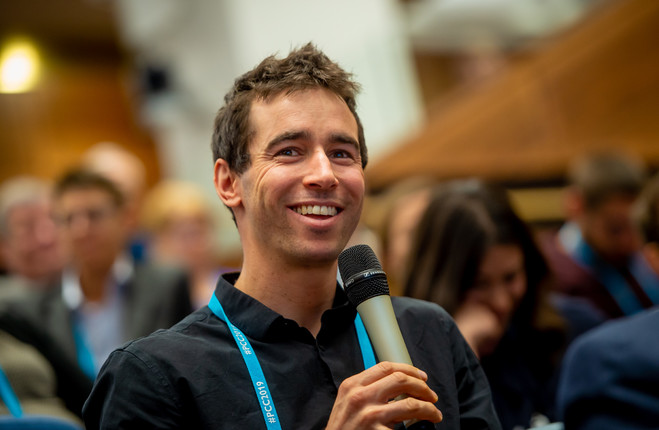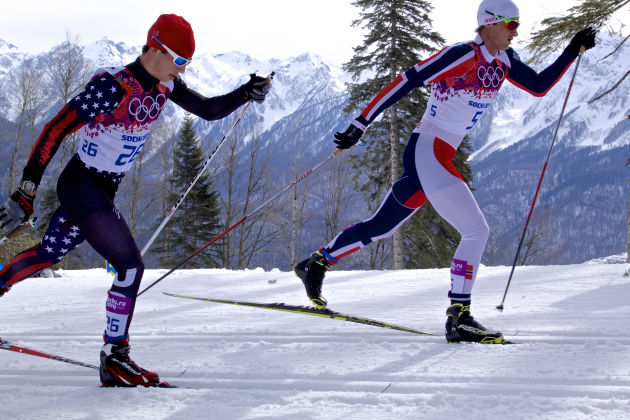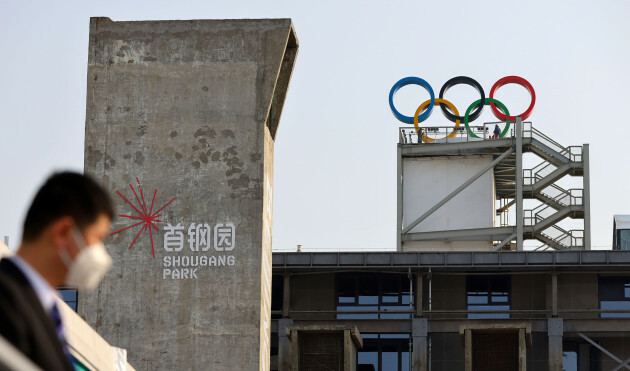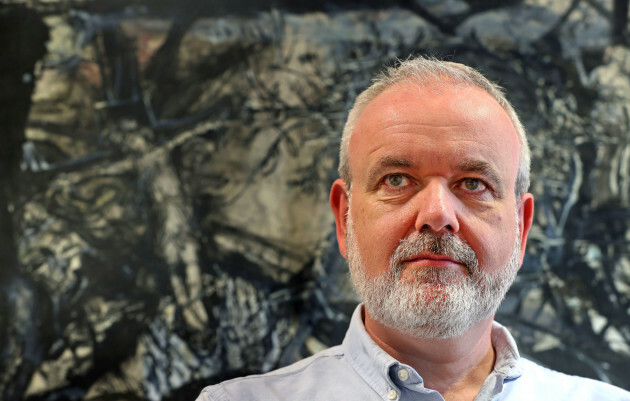LAST UPDATE | 4 Feb 2022
NOAH HOFFMAN IS no stranger to sporting injustices.
At the 2014 Winter Olympics, he competed in the men’s 50-kilometre freestyle, which culminated in the first clean sweep in men’s cross-country skiing since 1992, as the Russian trio of Alexander Legkov (gold), Maxim Vylegzhanin (silver) and Ilia Chernousov (bronze) prevailed.
The event was clouded in controversy, however. In November 2017, Legkov and Vylegzhanin were stripped of their medals following doping offences, but the original results were restored following a successful appeal in February 2018.
Hoffman, who finished 26th in the race, believes the initial outcome should never have stood.
“My experiences in particular with the Russian state-sponsored doping scandal from 2014 was what galvanised my activism,” he tells The42. “I was the top American athlete for distance skiing in Sochi for men — the women, of course, were stronger. I was in the 50km race in Sochi when the three Russians skied away from the podium up the final hill. I was in that pack and watched them ski away from the group. It seemed superhuman at the time and then we learned later that it was. I felt completely cheated.”
He continues: “My motivation for getting into endurance sports in the first place was watching Lance Armstrong win the Tour de France [on multiple occasions]. And when it came out that that was also all a fraud, I felt completely betrayed. I almost abandoned my own athletic career because I felt so lied to, so deceived.
“So the Russian doping scandal was really the second big punch — the first one was before my career really got off the ground, the second was these athletes I was competing against who were part of this big state-sponsored doping scheme.
“And I didn’t blame the individual athletes. It’s clear to me that they had no choice but to be part of this scheme. Their choice was either to compete and dope or not compete at all — that’s not a choice that I ever faced. So I blamed the system, the authorities in Russia and the administrators at the World Anti-Doping Agency who allowed it to happen. That was what really motivated my activism and continues to today.”
The two-time Olympian spent roughly a decade in elite sport, with highlights including winning a World Cup event and being a three-time US national champion.
Hailing from Evergreen, Colorado, Hoffman competed in cross-country skiing at both the 2014 Winter Olympics in Sochi and the 2018 Games in Pyeongchang.
He retired soon after the latter event and has gone on to balance an economics degree at Brown University in Providence, Rhode Island alongside work with the international athlete-led movement Global Athlete.
In an industry that has a reputation for bland platitudes and, in some quarters, an unwillingness to seriously engage with politics, Hoffman stands out for being an outspoken critic.
It helps, of course, that he has retired from competing and can now observe events from a distance, and he knows all too well the pain that can be caused by systemic failures and inadequate governance at the top level.
Indeed, in sport, ruthlessness and unethical behaviour can often be rewarded rather than punished and Hoffman learned this lesson the hard way.
***
Critics of the upcoming Winter Olympics, which open today in Beijing, argue it amounts to sportswashing.
A recent Daily Mail article suggested they should be renamed the Genocide Games.
According to Human Rights Watch, up to one million Uyghur Muslims have been detained arbitrarily in hundreds of camps in the Xinjiang region.
Speaking to The42 via email, Executive Director of Amnesty Ireland, Colm O’Gorman, is one of those to describe the upcoming Games as sportswashing.
“When China hosted the Olympic and Paralympic Summer Games in 2008, the Chinese authorities promised the Olympics would be accompanied by human rights improvements in China,” he says. “This did not happen. In fact, the human rights situation has continued to worsen sharply during the past decade, especially since Xi Jinping became president in 2013.
“With the organisation of the 2022 Olympic and Paralympic Winter Games, the Chinese government aims to showcase how China has grown since the 2008 Summer Games. It wants to highlight China’s superpower status and deflect attention from its abysmal human rights situation. The Chinese government is using the Olympics to try to improve its global image, capitalising on the glamour, prestige and public interest of sport to gloss over its deplorable human rights record.”
The recent controversy involving Peng Shuai is another major talking point, as there are fears for her well-being. After the tennis star alleged online in November that she had been “forced” into sex by a Chinese former vice-premier during a years-long on-and-off relationship, she subsequently disappeared, with the International Olympic Committee this week pledging to support the 36-year-old amid ongoing uncertainty regarding her whereabouts.
The IOC did hold a video call with Peng in November, and then announced she was “safe and well”. However, this action did little to alleviate the controversy, with the Women’s Tennis Association (WTA) saying the video “does not change our call for a full, fair and transparent investigation, without censorship, into her allegation of sexual assault”, while human rights lawyer Nikki Dryden accused the embattled organisation of facilitating a “publicity stunt”.
Hoffman feels the IOC’s handling of the situation was telling.
“They have shown that their relationship with the Chinese Communist Party (CCP) supersedes their care for athletes. They have prioritised that relationship over Peng Shuai’s safety. And that’s emblematic of what they’ve done in general, by awarding the games to Beijing.
“They put athletes in this horrible position where the discussion of these Games is entirely centred around the human rights abuses and the genocide that’s happening in China. The focus is not on the athletes or the sporting competition and performances, it’s a total distraction.
“Not only that, but the athletes’ safety is at stake. We have the organising committee in Beijing threatening to punish any athlete that speaks out, but Chinese law when it comes to speech is extremely opaque. We don’t have the IOC defending the athletes’ right to speak out in that situation and what we’ve seen is that they won’t defend athletes.
“People try to equate these Games to Sochi. I was in Sochi and I can tell you that I know there were issues around human rights and in particular, LGBTQ rights. But there was nothing like what we are seeing in Beijing. My former teammates have had to get burner phones and rental computers because there’s no digital privacy in Beijing and they’ve had to have mini briefings from the US state department on personal safety.”
In relation to the Peng Shuai scandal, O’Gorman adds: “The Chinese government has repeatedly attempted to shut down the country’s #MeToo movement – including by censoring, downplaying, harassing or vilifying survivors of sexual assault. On this and many other issues, authorities in China repeatedly shut down dissent.
“Another example is the Beijing-imposed National Security Law in Hong Kong, which forced Amnesty to shut down our Hong Kong offices as the law made it impossible for us to work freely and without fear of serious reprisals from the government.”
O’Gorman also believes the IOC “should respect athletes’ and sports officials’ freedom of expression” but adds: “When it comes to the Chinese authorities, it is impossible to predict how they might react to athletes who publicly address human rights issues.”
Hoffman, meanwhile, would normally encourage athletes to speak out against perceived injustices, but in this case, feels they would likely be better off staying silent.
“I came to the conclusion that if I were competing in Beijing, I would be silent because the risk is just too high,” he explains.
“We know that neither the CCP nor the IOC are going to protect athletes so I believe athletes should stay quiet. And I believe athletes should wait until they get home to speak out for their own personal safety.”
Meanwhile the 13 sponsors of the Games — who include Coca Cola, Allianz, Intel and Airbnb — have so far been quiet on these issues despite the significant criticism elsewhere.
“The silence from the sponsors is inexcusable,” says Hoffman. “It’s deafening, given how much global media coverage there has been of the human rights abuses in China, of the situation with Peng Shuai, of the lack of digital privacy for athletes and the journalists who are going to Beijing to cover these Games.
“The time for sponsors to get involved is right now. Sponsors have the leverage that nobody else has over the IOC, and they really can start moving this movement towards accountability and towards sustainability. That’s going to do wonders to increase the value of their investment.
“People are turning off, people are not interested in watching, people are boycotting the media coverage of the Games, that hurts the investment from the sponsors. So sponsors not only have a business interest in pushing back and holding the IOC accountable for putting all of us in this situation. They also have a moral obligation to stand up for athletes and to stand up for the victims of genocide in China and to make sure that this never happens again.”
The human rights issues have prompted countries including the US, Australia, and Britain to undertake a diplomatic boycott of the Games and while Hoffman supports this stance, he believes it doesn’t go far enough and overlooks the IOC’s support of the event.
“I think it’s not as impactful as it could have been if the coalition of countries were larger. And I think the focus of the boycott should have also included the organisation that put countries in this position.”
The IOC have argued in the past that they “must remain neutral on all global political issues,” but O’Gorman says in response: “Human rights issues are not political issues, and the IOC have responsibilities on human rights issues.”
Work continues to be done behind the scenes to raise awareness of the precarious situation in China.
“We have launched the Free the Five campaign, which highlights the plight of five individuals who have been imprisoned, otherwise detained or disappeared for exercising their human right to freedom of expression,” adds O’Gorman. “These individuals all belong to communities that have been particularly harshly targeted in the Chinese government’s continuing assault on freedom of expression and related human rights. Simply by peacefully expressing themselves and refusing to give in to repression, they have demonstrated Olympic-level courage.”
And despite the sense of pessimism and relative powerlessness that some critics feel in relation to the upcoming Games, Hoffman remains hopeful that the activism work that he and others engage in can help make a substantial difference ultimately.
“I believe in the power of sport to be a unifying force, to bring countries together and transcend stark political divides we see, certainly in my country in the US and in the world. And so, I’m not ready to give up on sport and I hope others are not.”




